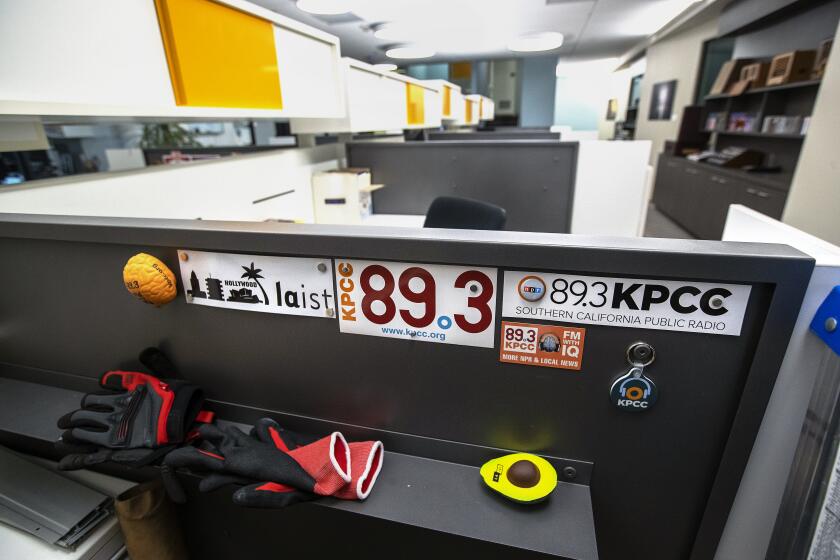First Executive’s Bond Portfolio Is Average Junk : Insurance: Company President and CEO Fred Carr used to boast about his savvy bond buys. Now his highly profitable portfolio has plummeted by $1.9 billion.
Fred Carr was once lauded for providing his insurance company’s policyholders and shareholders with heady returns through his active and savvy management of a massive pool of risky investments.
But an analysis of Carr’s investment portfolio reveals that he has done no better than the average junk bond buyer--which is dismal now that the junk bond market has gone into the tank.
Carr, president and chief executive of First Executive Corp., has been one of the nation’s biggest buyers of this high-yield debt since it became popular in the early 1980s. He’s boasted in the past about cleverness in weeding through the issues to pick only the very best bonds.
But, almost overnight, Carr’s gone from hero to bum. His company’s profits have evaporated. His policyholders are abandoning First Executive’s operating subsidiaries, Executive Life Insurance Co. and Executive Life of New York, in droves. And his biggest shareholders are talking about an ouster.
The reason for the turnaround? Carr’s once highly profitable bond portfolio has declined in value by at least $1.9 billion. And the future performance of the highly volatile and risky junk bond market is pivotal to the Los Angeles insurer’s very survival, industry experts said.
“There are two things that can do them in: a large number of defaults in the junk bonds they hold or a run on the bank, which would force them to realize some of the unrecognized losses in their junk portfolio,” said Frederick Townsend, president of Townsend & Schupp, a Hartford, Conn., research firm.
Still, according to industry experts and an analysis of a segment of First Executive’s high-yield bond portfolio by the Los Angeles Times, he’s done no better or worse than the average junk buyer.
The Times examined Executive Life’s investment portfolio, as described in state Insurance Department filings and selected a group of 30 bonds in an attempt to reflect the overall package, both good and bad. The criteria for choosing the bonds was that they are actively traded and purchased by First Executive in relatively large quantities. The company’s purchases and sales of these 30 issues were then tracked through the third quarter of 1989, the most recent period for which data is available, to determine performance.
Overall, the market value of this sample portfolio has slid about 20%, to less than $1.1 billion from $1.38 billion. Industry experts caution that the company’s total portfolio probably would have deteriorated more because this analysis does not include rarely traded issues, which generally sell at steeper discounts. First Executive has a wide variety of these hard-to-sell bonds, but they were not included in the sample because it is virtually impossible to get accurate market prices for them.
First Executive has said its total portfolio has declined in value by $1.9 billion--roughly a 30% drop.
But a 20% to 30% decline is not unusual these days, said Michael Singer, president of R. D. Smith & Co., a New York firm that specializes in buying and selling securities issued by troubled companies. Some of the publicly traded mutual funds that invest in junk bonds have seen asset values decline as much as 40%, he said.
First Executive’s junk bond portfolio reflects the market as a whole, added another industry expert.
“They haven’t done a particularly bad job or a particularly good job. They’ve just ridden the market down,” he said. “I don’t believe they’ve suffered disproportionately.”
Nevertheless, it is a far cry from Carr’s claims of only six years ago, when he was taking bows for First Executive’s financial successes and fast growth. At the time, Carr maintained that the generous yields on junk bonds were more a product of inefficiencies in the marketplace than real credit risk. Additionally, he said he was able to wade through the junk issues to find the gems.
The Times’ review of Executive Life’s $10.6-billion bond portfolio revealed a number of gems and plenty of junk.
First Executive, through its insurance subsidiaries, has invested heavily in now bankrupt companies such as Hillsborough Holdings, Allied Stores, Federated Department Stores and Southmark Corp., but it also has bought the securities of thriving firms such as Holiday Inns, Viacom and FMC Corp.
To be specific:
* The company assembled a $155.5-million stake in Hillsborough Holdings, a bankrupt firm that issued bonds in connection with a Kohlberg Kravis Roberts & Co. buyout of the former Jim Walter Corp. Hillsborough’s bonds are now worth about 15 cents on the dollar, leaving Executive Life with roughly $116 million in paper losses.
* It bought $26.75 million of Integrated Resources’ debt. Integrated, a financial services and limited partnership concern, is now so troubled that its debt sells for about 2 cents on the dollar. First Executive’s paper losses amount to just over $26 million.
* First Executive also snapped up nearly $130 million of E-II Holdings’ bonds. E-II debt, which is controlled by Meshulam Riklis, now sells for 60 to 65 cents on the dollar, even though Riklis has extended a tender offer that would pay bondholders slightly more. First Executive’s paper losses: about $46 million.
On the other hand, even in the currently depressed junk market, First Executive can point to a handful of success stories.
* For example, First Executive spent about $30.4 million on Multimedia Corp. bonds. When the insurer bought its stake, Multimedia’s debt was depressed, selling for about 54 cents on the dollar. It has since recovered, and First Executive has a paper profit of about $20 million on the holding.
* It also bought a $108.3-million stake in Holiday Inns’ senior notes. Holiday has offered to buy back its debt at a premium. First Executive should post a $4.3-million profit on the deal.
* The company’s $64.9-million holding in Occidental Petroleum’s senior subordinated notes has also appreciated, although more modestly. It is now worth about $670,000 more than First Executive paid.
A number of other issues in First Executive’s portfolio are extremely healthy and have declined in value only because of the market’s malaise, industry experts said. If the company can wait to sell these issues until they mature or the market recovers, it should do well. Among those issues are Healthtrust Hospital Corp., McCaw Cellular, Mattel and Viacom.
Yet some big institutional holders of First Executive stock are critical of Carr’s portfolio management, partly because he acknowledged as much as two years ago that the junk bond market was getting overvalued.
“Fred has mentioned in many public forums over the past two years that junk bonds were overpriced,” said the owner of one big East Coast money management firm. “But there was no recognition on his part of the desirability of selling them.”
Now, opportunities to sell the bonds are limited and investors are angry that Carr bet the company on such a speculative investment.
Moreover, they point to Carr’s past claims that his active management of the portfolio would guide the company through hard times. Carr has also been openly critical of other insurers in the past, maintaining that their conservative investment philosophies left them with low-yielding securities that, if written down to current market values, would wipe out the net worth at a number of these companies.
Instead, he said, insurers should trade their investments to generate investment gains.
In a 1984 interview with The Times, for example, Carr said: “If your portfolio doesn’t generate capital gains consistently, if investors are not interested in buying what you have, then you are not buying the right things.” Capital gains are generated when a company sells an investment at a profit.
Ironically, if Carr were forced to mark his investment portfolio down to current market values, it would wipe out First Executive’s net worth--a scenario he once described as “not just bad but catastrophic” when speaking of his competitors.
And recently, First Executive has been better at damage control than generating capital gains.
The company had a $30.1-million stake in Southmark Corp. at year-end 1988, for example. But sensing severe problems at the company, First Executive began to unload the bulk of its Southmark holdings last year. Southmark filed for bankruptcy protection earlier this year, and its bonds now sell for about 16 cents on the dollar. Although First Executive has recognized losses of about $14.5 million on the investment, its losses would have surpassed $25 million had it held onto the bonds.
The company also sold its Allied Stores senior notes last year, which cut its losses to $5.4 million, compared to the potential loss of $8.3 million if those bonds were still in its portfolio.
Not surprisingly, industry experts are uncertain about First Executive’s future, which they say almost completely hinges on the future performance of the junk bond market.
“We would still say there is a fairly low chance of a meltdown” at First Executive, said Weston Hicks, vice president and associate director of Moody’s Investors Service in New York. “But that’s not to say there is no chance.”
FIRST EXECUTIVE HOLDINGS: A SAMPLER
Purchase price Market value Bond (in millions) (in millions) Allied Stores sr notes $14.15 $8.72* Allied Supermarkets sub deb 8.56 8.5 Cablevision sr sub deb p/p 19.89 16.6+ Charter Medical sr disc note 66.9 75.7 Circle K Corp. s/d 23.3 5.97 Coastal Corp. 46.28 45.8 sub fixed-rate notes E-II Holdings sub deb 27.64 16.6 E-II sr sub notes 102.35 66.7 Enron Corp. sr sub deb 8.59 9.41* FMC Corp. sr sub debs 11.7 11.44++ Great American Communications 23.53 15.85 Healthtrust Hosp. ESOP sr nt 158.00++ 154.84++ Hillsborough Holding 95.85++ 14.37++ sr sub ext reset notes Hillsborough Holdings 59.62++ 24.85++ sub nt p/p Holiday Inns sr notes 108.34 112.67 Home Shopping 25.1++ 28.25++ Integrated Resources 26.75 0.61 sr sub notes Intelogic Trace sui deb 10.13 5.0 R.H. Macy senior sub deb 25.41 24.09 Mattel Inc. sub sf deb 40.98 38.34 McCaw sr sub deb 70.47++ 58.72++ Multimedia 9.9 14.25 Series A sub disc deb Multimedia 20.51 36.1 Series B sub disc deb National Gypsum sr deb 16.05 9.57 Occidental Petroleum 64.9++ 65.79++ sr sub notes RJR Holdings Capital 101.5 74.1 sub deb pik RJR Holdings Capital 61.51 49.3 sub disc deb SCI Television sub debs 40.17 25.6 Southmark sr notes 30.1++ 15.6++ Viacom Intl. 60.41++ 60.2++ sr sub reset notes TOTAL 1,378.58 1,093.54
Profit/loss Bond (in millions) Allied Stores sr notes -$5.43* Allied Supermarkets sub deb -0.06 Cablevision sr sub deb p/p -3.29 Charter Medical sr disc note +8.8 Circle K Corp. s/d -17.33 Coastal Corp. -0.48 sub fixed-rate notes E-II Holdings sub deb -11.04 E-II sr sub notes -68.65 Enron Corp. sr sub deb +0.82 FMC Corp. sr sub debs -0.28 Great American Communications -7.68 Healthtrust Hosp. ESOP sr nt -3.16++ Hillsborough Holding -81.47++ sr sub ext reset notes Hillsborough Holdings -34.77++ sub nt p/p Holiday Inns sr notes +4.33 Home Shopping +3.15++ Integrated Resources -26.41 sr sub notes Intelogic Trace sui deb -5.13 R.H. Macy senior sub deb -1.32 Mattel Inc. sub sf deb -2.64 McCaw sr sub deb -11.75++ Multimedia +4.35 Series A sub disc deb Multimedia +15.59 Series B sub disc deb National Gypsum sr deb -6.48 Occidental Petroleum +0.89++ sr sub notes RJR Holdings Capital -27.4 sub deb pik RJR Holdings Capital -12.21 sub disc deb SCI Television sub debs -14.57 Southmark sr notes -14.49 Viacom Intl. -0.21++ sr sub reset notes TOTAL -285.04
* Actual sales price and profit/loss
+ Bond is not actively traded. Market price is estimated.
++ Reflects profit or loss from trading activity through 9/30/89.
Current market prices provided by Houlihan, Lokey, Howard & Zukin in Los Angeles.






